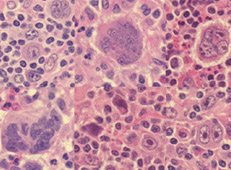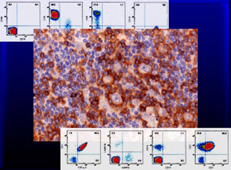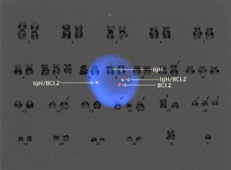- HOME
- Laboratories
- Pathology
- Projects
- Pathological and molecular studies for hematological neoplasms
Projects
- Histological criteria for effectiveness of chemo- and radio-therapy for gastrointestinal tumors
- Study of premalignant and in-situ carcinoma for Bile-duct and pancreas group
- Histopathological study towards selection of treatment modalities and outcome prediction in head and neck cancer
- Studies by Breast Group
- Hepatocarcinogenesis using experimental liver cancer models
- Pathological studies for gynecological malignancies
- Diagnostic and etiologic studies for lung cancers
- Clinicopathological studies with aids of chromosome analysis for genitourinary cancers
- Pathological and molecular studies for bone and soft tissue tumors
- Pathological and molecular studies for hematological neoplasms
Pathological and molecular studies for hematological neoplasms
Member: Drs. K. Takeuchi , N. Tsuyama
Hematopathology plays an important role in diagnosis and research of hematological malignancies such as leukemia and lymphoma, and non-malignant hematological disorders. Since Cancer Institute is a specialized institute in the treatment and research of malignant diseases, we focus on the diagnosis, treatment and research of lymphoma among the hematological diseases.
The useful information in lymphoma diagnosis is the following:
- Morphology (microscopic examination j)
- Immunophenotype (immunohistochemistry and flowcytometry)
- Genetic features (molecular analysis, cytogenetics and in situ hybridization)
- Clinical features iage, sites of lesions, symptoms, history and others j)
The world standard lymphoma classification, WHO classification of tumors of hematopoietic and lymphoid tissues (2001), covers more than 40 types of lymphoma. Each type has different pathobiological and clinical features, leading to a variety of optimal treatment strategies. The accurate diagnosis of lymphoma is, therefore, crucial in selecting the best, most effective treatment for individual patients. Hematopathologists collect, comprehend and integrate the above-mentioned information appropriately into the definite diagnosis.
In the Department of Pathology, the hematopathologist specialized in lymphoma is responsible for all the diagnoses of lymphoma based on biopsy samples. The Department holds case conferences 3 times a week to closely collaborate with the Department of Clinical Oncology. We make diagnoses for approximately 500-600 cases per year, including approximately 300-400 cases of consultation from different hospitals.

Fig.1:
Hodgkin & Reed-Sternberg cells
Fig.2:
Immunohistchemistry and Flowcytometry
Fig.3:
Follicular lymphoma: Cytogenetics and Fluorescence In Situ Hybridisation (FISH) for IgH/BCL2




